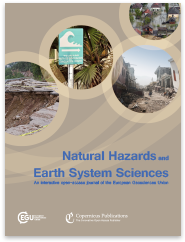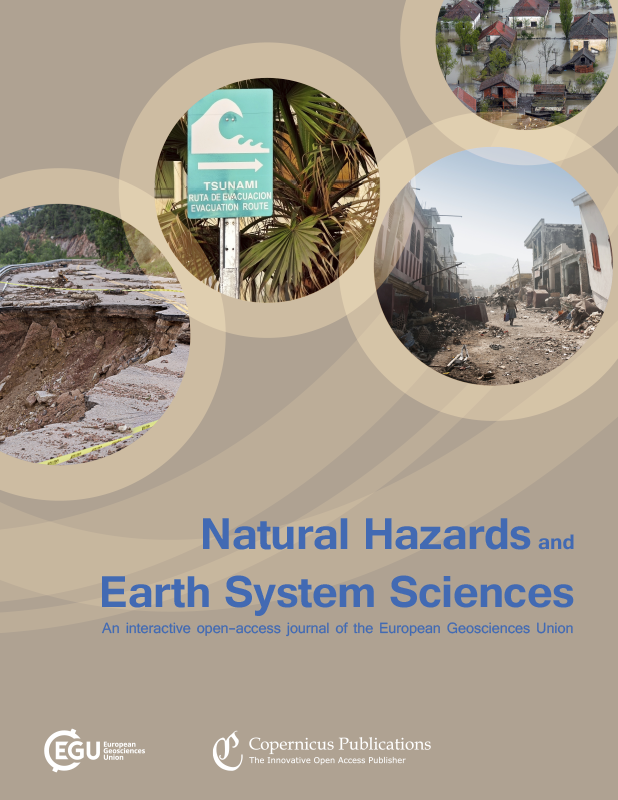Executive editors: Animesh Gain, Margreth Keiler, Gregor C. Leckebusch, Bruce D. Malamud, Paolo Tarolli & Uwe Ulbrich
eISSN: NHESS 1684-9981, NHESSD 2195-9269
Natural Hazards and Earth System Sciences (NHESS) is a not-for-profit interdisciplinary and international journal dedicated to the public discussion and open-access publication of high-quality studies and original research on natural hazards and their consequences. Embracing a holistic Earth system science approach, NHESS serves a wide and diverse community of research scientists, practitioners, and decision makers concerned with detection of natural hazards, monitoring and modelling, vulnerability and risk assessment, and the design and implementation of mitigation and adaptation strategies, including economical, societal, and educational aspects.
Journal metrics
NHESS is indexed in the Web of Science, Scopus, Google Scholar, etc. We refrain from displaying the journal metrics prominently on the landing page since citation metrics used in isolation do not describe importance, impact, or quality of a journal. However, these metrics can be found on the journal metrics page.
News
03 Dec 2025
New MS Word template available for manuscript preparation
The existing MS Word template for authors has been significantly expanded and now includes many important notes on the standard sections that must be included in the manuscript. Please visit the "Submission" page, section "Templates for your manuscript file" and download the new template before writing your next manuscript. 
03 Dec 2025
New MS Word template available for manuscript preparation
The existing MS Word template for authors has been significantly expanded and now includes many important notes on the standard sections that must be included in the manuscript. Please visit the "Submission" page, section "Templates for your manuscript file" and download the new template before writing your next manuscript. 
10 Feb 2025
Thank you to all our referees in 2024!
A big thank you to all referees for their volunteer work in providing fair, thorough, and constructive peer-review reports! Through their invaluable contribution our interactive open-access journals maintain their high scientific standards and their ongoing success. 
10 Feb 2025
Thank you to all our referees in 2024!
A big thank you to all referees for their volunteer work in providing fair, thorough, and constructive peer-review reports! Through their invaluable contribution our interactive open-access journals maintain their high scientific standards and their ongoing success. 
20 Jan 2026
| Highlight paper
The first Earthquake Early Warning System for the high-speed railway in Italy: enhancing rapidness and operational efficiency during seismic events
Simona Colombelli, Aldo Zollo, Francesco Carotenuto, Alessandro Caruso, Luca Elia, Gaetano Festa, Sergio Gammaldi, Antonio Giovanni Iaccarino, Giovanni Iannaccone, Alberto Mauro, Matteo Picozzi, Giulia Polimanti, Rosario Riccio, Stefania Tarantino, Francesco Cirillo, Andrea Vecchi, and Franco Iacobini
Nat. Hazards Earth Syst. Sci., 26, 299–314, https://doi.org/10.5194/nhess-26-299-2026,https://doi.org/10.5194/nhess-26-299-2026, 2026
Short summary

19 Jan 2026
Econometric modelling for estimating direct flood damage to firms: a micro-scale approach using post-event records in Italy
Marta Ballocci, Daniela Molinari, Giovanni Marin, Marta Galliani, Alessio Domeneghetti, Giovanni Menduni, Simone Sterlacchini, and Francesco Ballio
Nat. Hazards Earth Syst. Sci., 26, 251–270, https://doi.org/10.5194/nhess-26-251-2026,https://doi.org/10.5194/nhess-26-251-2026, 2026
Short summary
Highlight articles
20 Jan 2026
The first Earthquake Early Warning System for the high-speed railway in Italy: enhancing rapidness and operational efficiency during seismic events
Simona Colombelli, Aldo Zollo, Francesco Carotenuto, Alessandro Caruso, Luca Elia, Gaetano Festa, Sergio Gammaldi, Antonio Giovanni Iaccarino, Giovanni Iannaccone, Alberto Mauro, Matteo Picozzi, Giulia Polimanti, Rosario Riccio, Stefania Tarantino, Francesco Cirillo, Andrea Vecchi, and Franco Iacobini
Nat. Hazards Earth Syst. Sci., 26, 299–314, https://doi.org/10.5194/nhess-26-299-2026,https://doi.org/10.5194/nhess-26-299-2026, 2026
Short summary

More highlight articles  All EGU highlight articles
All EGU highlight articles 
Notice on the current situation in Ukraine
To show our support for Ukraine, all fees for papers from authors (first or corresponding authors) affiliated to Ukrainian institutions are automatically waived, regardless if these papers are co-authored by scientists affiliated to Russian and/or Belarusian institutions. The only exception will be if the corresponding author or first contact (contractual partner of Copernicus) are from a Russian and/or Belarusian institution, in that case the APCs are not waived.
In accordance with current European restrictions, Copernicus Publications does not step into business relations with and issue APC-invoices (articles processing charges) to Russian and Belarusian institutions. The peer-review process and scientific exchange of our journals including preprint posting is not affected. However, these restrictions require that the first contact (contractual partner of Copernicus) has an affiliation and invoice address outside Russia or Belarus.




